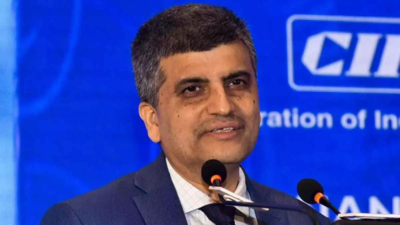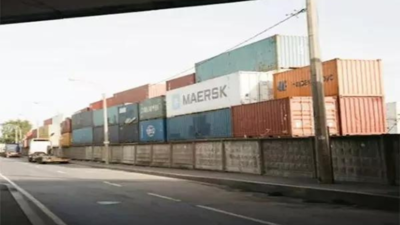Must be agile to tackle challenges: Finance secretary Ajay Seth

NEW DELHI: While sounding upbeat about the economy, finance secretary Ajay Seth on Friday underlined the need to ensure fiscal consolidation and remain agile to deal with challenges facing the economy.
“India can’t remain fixated. We have to be adept and agile, and as things are evolving, we cannot take things for granted. India is close to a $4 trillion economy. We have enough resilience to find whatever the rest of the world is doing, we have to find our way, and I’m hopeful that we can find out,” he said at an event organised by Isaac Centre for Public Policy.
The comments come amid expectations of a global economic slowdown triggered by US President Donald Trump‘s tariff hikes. Seth said the Indian economy was projected to expand by 6.3-6.8% this year and the numbers pointed to healthy tax collections during the March quarter.
Referring to the focus on re-prioritising expenditure through the Centre’s focus on capex, the top civil servant in the finance ministry underlined the need for states to tackle revenue deficit. Some of the state govts, including some of the high-income states, are moving towards financing current expenditure rather than investing in people, he cautioned.
“One has to remain committed and deliver on that for two reasons, and one of the reasons why credit rating agencies look more cautiously towards India is the elevated debt level,” he said.
Seth also said that rating agencies provided 15% weight to governance and depended on a World Bank index, which was based on a survey. Emerging economies, including India, have asked the World Bank to make its World Governance Index more objective.
The second issue was to raise the tax-to-GDP ratio from 18% to around 20%. “But we are at the sweetest spot at the current level of income. We aspire to be 20%, and that will take five-six years,” he said.
Seth, who just returned from the annual meetings of the World Bank and IMF, said that countries are seeking a rebalancing in the global trade architecture.
About energy transition, he said its importance has come down, with countries across the globe now focusing on energy security in the changed world order. “It was more about energy security, which was being talked about (at the recent World Bank-IMF annual meeting). Of course, there are a few economies that were still very bullish about it, but the general sense was the energy security…” he said.





